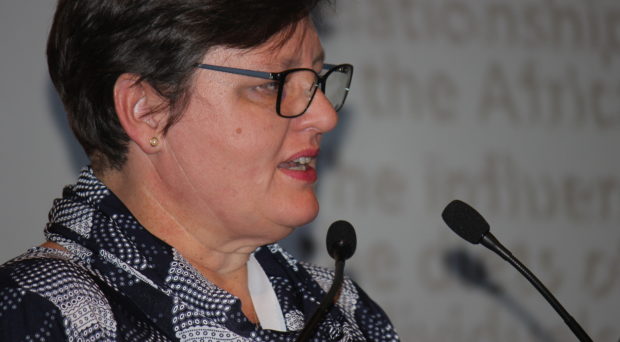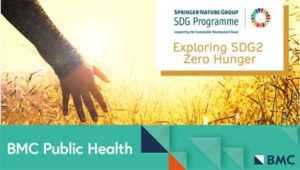
Welcome to our SDG Editorial Board Members blog collection. We are hearing from the Editorial Board Members of the BMC Series journals whose work aligns with achieving the Sustainable Development Goals. Here you can find other posts in this collection, grouped with the tag ‘SDG editorial board members‘.
Actively advancing the SDGs – an exciting, challenging and rewarding journey
Tod ay’s societal challenges are complex. Tackling the complexity requires that researchers with diverse backgrounds actively work together. Transdisciplinary research provides exciting opportunities to unravel the complexity and explore solutions. Over the past two decades, I have been privileged to work at the interface of these challenges – at the global, African and country-level. I have also trained a cadre of professionals in adopting transdisciplinary mindsets.
ay’s societal challenges are complex. Tackling the complexity requires that researchers with diverse backgrounds actively work together. Transdisciplinary research provides exciting opportunities to unravel the complexity and explore solutions. Over the past two decades, I have been privileged to work at the interface of these challenges – at the global, African and country-level. I have also trained a cadre of professionals in adopting transdisciplinary mindsets.
My research and policy work focuses primarily on SDG 2 that seeks to end hunger, achieve food security, improve nutrition, and promote sustainable agriculture. However, this SDG touches all other SDGs and underpins the human rights fundamental to achieving all other SDGs.
A significant challenge in working on SDG2 is the diverse understandings of its components. I have found that the essential starting point is to make sure everyone around the table understands what we are discussing – in meetings with communities, policymakers or researchers. Assuming everyone is on the same page is a monumental mistake. Even in the international domain, SDG2 is often incorrectly labelled ‘ending hunger’ – only one element of SDG2. Hunger is an extreme (acute) form of food insecurity but also includes other outcomes such as malnutrition and the complexities of the coexistence of undernourishment and obesity in poor communities.
Some of these misconceptions relate to views that food security relates only to production rather than considering the inter-linked core elements of food security: availability, access, nutrition, resilience, agency and sustainability. Yet, this 1970’s production perspective has changed with our deeper understanding of food insecurity and its causes. Malnutrition is often understood as undernutrition rather than embracing all forms of malnutrition: undernutrition, micronutrient deficiencies (often termed ‘hidden hunger’) and overweight (including obesity).
Moreover, food security is not a static condition. Households can become more or less food insecure over time or seasons. Simultaneously achieving the four inter-linked elements of the SDG2 is the focus of the September 2021 United Nations Food Systems Summit. All four elements of SDG2 are outcomes of sustainable food systems but require specific actions to ensure that the elements of food systems work together to deliver on SDG2. The food systems approach provide ‘lenses’ to examine the effectiveness of food system components and stakeholders. Food systems approaches can help identify opportunities to address failures and tradeoffs in the system.
The field of study related to SDG2 is changing rapidly, making research in this field exciting, challenging and rewarding. Working in this field has led to opportunities to work with diverse international transdisciplinary teams. From these treasured engagements, I have learnt an enormous amount about many topics that touch on, underly and shape research on SDG2. These opportunities have included drafting consensus reports with regional and international foci to direct scientific input into international processes such as the United Nations Food Systems Summit preparation to embarking on challenging research analysis with relatively large teams of international experts. My work enabled participation in the drafting of the United Nations High-Level Panel of Experts on Food Security and Nutrition, which first defined food systems in 2014.
Through these opportunities, one learns how to share your own knowledge in a way that others outside of your field of expertise can understand while building your own knowledge from the engagement with others. Such engagement requires flexibility in thinking and the willingness to expand your scope of knowledge. It requires a great deal of listening and learning – something that does not come naturally to Professors.
While there are only nine years left before the end of the SDG era (2016 – 2030), we still have so much to learn about how to face, embrace and overcome the complexity of the issues related to SDG2. I believe that the opportunities afforded by the digital connectivity during the COVID pandemic have helped significantly advance our understanding of SDG2 in the context of food systems. The continual engagement by a range of stakeholders with the UN Food Systems Summit preparation has enabled the identification of ‘game changing’ solutions to advance progress on the SDGs. These solutions offer guidance on the future directions for researchers committed to supporting progress on the SDGs and SDG2 in particular. There are also opportunities for researchers to track the implementation and effectiveness of the solutions chosen by food systems stakeholders – albeit countries or the private sector. Stepping up to these opportunities will inform progress towards 2030 and provide the evidence base to inform the subsequent development era (post the SDGs).
Comments